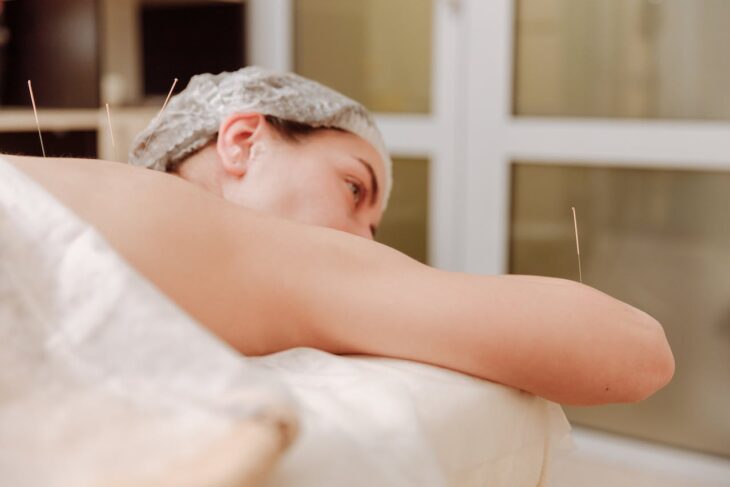
Acupuncture is the practice of inserting very fine needles into the body at certain points. There are certain points located along the meridians, or energy channels, which when manipulated may correct imbalances within the body. Acupuncture is a key component in the practice of Traditional Chinese Medicine and restores homeostasis, or optimal function, to the body.
The practice of Traditional Chinese Medicine involves a holistic understanding of the body. The practitioner attributes diseases to imbalances within. The acupuncturist evaluates the individual and customizes an acupuncture plan that brings the body back to balance.
Conditions such as recurring migraines, stress, body aches, depression, arthritis and more respond well to acupuncture and many doctors prescribe acupuncture for infertility. Although this treatment doesn’t address all infertility diagnoses many patients with hormone imbalances and thyroid conditions benefit from acupuncture.
What You Need to Know About Acupuncture & Fertility
As the practice becomes more mainstream many doctors turn to acupuncture for balancing hormones, improving ovarian and follicular function, and increasing blood flow to the uterus which facilitates healthy uterine lining and creates a welcoming environment for your embryo. Some studies even suggest acupuncture improves the outcome of IVF especially when practiced on the day of embryo transfer. Here are five things we think you should know about acupuncture and fertility.
1. Who Benefits from Acupuncture for Fertility?
Everyone finds some benefit from acupuncture. Those fertility patients seeking treatment for recurring miscarriage, elevated follicle stimulating hormone (FSH), luteal phase defect, hyperprolactinemia, absence of ovulation or anovulation, PCOS, unexplained infertility and male factor, including sperm DNA fragmentation may find acupuncture helpful. Also, those females with spasmodic fallopian tubes benefit from acupuncture. However, acupuncture does not treat those females diagnosed with endometriosis, tubal blockage or scarring but it may ease the stress surrounding those conditions.
2. What Are the Risks?
Acupuncture carries very little risk as long as you use the services of an acupuncturist who specializes in fertility treatment. A general acupuncturist who doesn’t focus solely on treating infertility may address certain meridians that increase the risk of miscarriage. Ask your infertility clinic for recommendations for those acupuncture practitioners focused on infertility treatment.
3. When to Begin Acupuncture for Fertility
Acupuncture for fertility offers better results when used in combination with traditional treatment. One study confirms the benefits of acupuncture pre- and post-embryo transfer in IVF, especially for women with poor ovarian response. That being stated, you should commence your acupuncture treatment when you begin your IVF cycle. Of course, this depends on what your doctor recommends.
4. When to Halt Treatment
Acupuncture after embryo transfer may be critical to prevent miscarriage. Many doctors recommend you continue acupuncture with a practitioner who specializes in fertility and pregnancy through the first trimester, or the twelfth week of gestation. As acupuncture is relatively safe, you may maintain your treatment throughout your pregnancy. Acupuncture aids in calming morning sickness, treating the aches and pains as your uterus grows and maintaining your emotional wellness. If you benefit from acupuncture and your physician approves, you may continue through your entire pregnancy.
5. Does Acupuncture Change Once Conception Occurs?
Once conception occurs the focus of acupuncture changes from ovarian and follicular health, and creating a hospitable uterine environment, etc. to preventing miscarriage (not related to chromosomal abnormalities) and easing the early woes of pregnancy. Acupuncture also helps prevent high blood pressure in pregnancy which may result in pre-eclampsia, a very dangerous condition for both mother and baby.
Later in your pregnancy your acupuncture practitioner focuses on preparing the body for labor and delivery as well as promoting relaxation, easing muscle soreness, and helping with sleep. All in all, acupuncture is a very helpful tool throughout pregnancy. But always confirm with your doctor and get their approval, and remember the frequency and duration depend on your preferences and your doctor’s recommendation.
Find Out if Acupuncture is Right for You
Results vary and no studies show significant outcomes when using acupuncture with IVF there are many benefits. Infertility brings on stress for most people and acupuncture offers balance which alleviates stress, calms emotions, and boosts your immune system. Of course, acupuncture isn’t for everyone, but it may help.
Find out more about how acupuncture may help you through your fertility journey. Contact LA IVF today. We offer all the latest technology and treatment for infertility, and we look forward to walking the path to parenthood with you.









